„More spaces for beauty and self-care“
What does “beauty” mean to you?
Anton Rahlwes: Beauty is something that affects us all and which is also very fleeting and intangible. Beauty is highly emotional, but it also comes with a great deal of implications and standardisations. And beauty isn’t just visual.
So what is it then?
It’s an amalgamation of feelings and sensory perceptions. For “form”, we asked a friend of mine, who has been almost blind since the age of three, about his concept of beauty. That made it even clearer to me that, in addition to visual things, the way a surface feels, a person’s charisma or an embrace, can also be beautiful. And beauty is, of course, always a question of zeitgeist and current developments. Artificial intelligence is dominating the discourse at the moment.
Do you think artificial intelligence is changing our perception of beauty?
The interesting thing about this is the fact that the data AI uses to make “new” images is already there and it often reproduces social ideals or problems. I once entered the prompt “beauty” into the AI of my image-editing programme, which always generated the same images: portraits of conventionally attractive white women with long hair and doe eyes; diversity or complex gender roles were nowhere to be seen. You have to actively counteract this and question these ideals.
How would you describe your own style?
I have to feel comfortable, but I also try to break down boundaries. I like my masculinity to a certain extent while at the same time playing with “traditionally” feminine things. I sometimes wear skirts or statement earrings, for example.
How important is your beard for you?
Funnily enough, the first time I gave the topic of shaving any serious thought was when I was getting ready for this interview. I enjoy styling my beard, but I’ve never thought of shaving as a self-care ritual. I think that might change in the future. Interestingly enough, beards are something that are totally hyped up.
In what way?
For many men, beards are something where beauty and masculinity go hand in hand. Here in Frankfurt, you’ve got barbershops on every street corner. Beards are shaped, and eyebrows are maybe plucked or a face mask is applied. There’s scope for self-care, and men can be affectionate with each other. But this is often compensated for by an overt “masculinity”, lots of leather, whiskey, tattoos, and so on. I’d like to see more spaces in which men can celebrate unabashed beauty and self-care.
Which spaces could those be?
I’m not just thinking about physical spaces, but about our society as a whole, which must tolerate new, more complex masculinities. There have been, to date, only few, very niche places where men can be tender, weak and (self-)caring. They should learn that these attributes are always part of masculinity and can be embraced everywhere.

What self-care rituals keep you going?
I love trash TV! I deal with very complex content professionally and can switch off while watching series. When it comes to cosmetics, I’m pretty pragmatic, but I like to use make-up for special occasions. It’s exciting to see how you can change yourself and the impact you have.
Do you have a style role model?
I get a lot of inspiration from media of all kinds. For example, there’s a photo of the singer Frank Ocean in which he’s wearing very light blue eye shadow. That’s subtle, but it also breaks with traditional gender norms, which I think is cool.